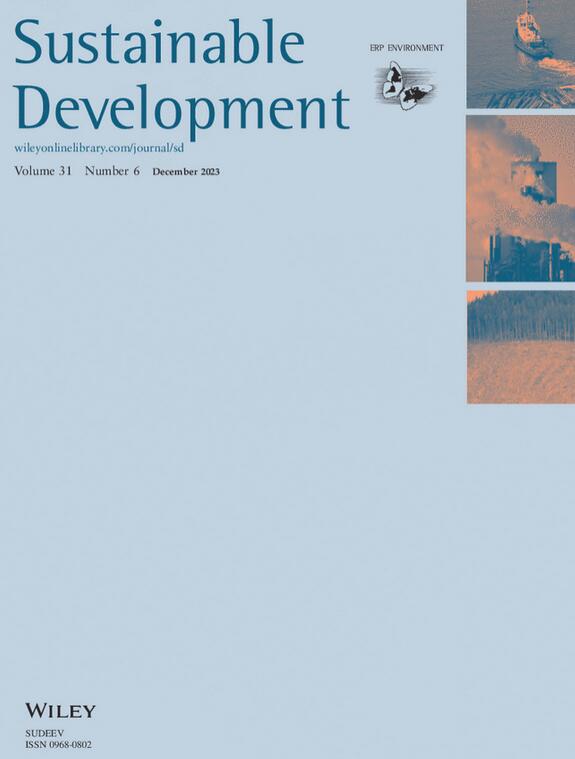在全球可持续发展目标排名中,谁赢谁输?厘清南北鸿沟和外国直接投资对溢出效应的影响
IF 8.2
1区 环境科学与生态学
Q1 DEVELOPMENT STUDIES
引用次数: 0
摘要
可持续发展报告(SDR)根据各国在17个可持续发展目标(sdg)方面的表现和努力提供了全面的全球排名。然而,反映一个国家的行动如何影响其他国家的溢出效应仍未得到充分探讨,特别是在它们与可持续发展目标绩效的相互作用方面。本文深入研究了这些溢出效应对环境和社会的跨境不利影响,并在南北鸿沟和外国直接投资(FDI)的背景下研究了它们与可持续发展目标排名的相关性。分析显示,可持续发展目标得分较高与负面溢出效应放大之间存在显著关联。虽然这一趋势在发达的北方国家占主导地位,但某些发展中的南方国家也表现出类似的趋势,可能会阻碍更脆弱国家的可持续发展目标。本文认为,许多国家通过剥削其他国家的生态和社会资源来实现可持续发展目标,这偏离了真正的可持续性和2030年议程的核心精神:“不让任何一个人掉队”。为了更清晰地了解各国的发展轨迹,本文提出了概念性指标,并利用数据可视化来重新评估可持续性进展。并介绍了四种发展趋势:剥削性发展、退化性发展、衰退性发展和可持续发展。研究结果强调,旨在从剥削性或退化性发展向可持续发展过渡的国家必须解决消费主义问题,优先考虑可持续发展目标12(负责任的消费和生产),并抵消可持续发展目标13(气候行动)的退化。至关重要的是,竞争心态和缺乏国际合作将阻碍可持续发展目标的实现,这凸显了在环境和社会正义与公平方面采取集体行动的迫切需要。本文章由计算机程序翻译,如有差异,请以英文原文为准。
Who wins and who loses in global SDGs rankings? Clarifying the influence of the North‐South divide and foreign direct investment on spillover effects
Abstract The Sustainable Development Report (SDR) provides comprehensive global rankings based on countries’ performance and efforts toward the 17 Sustainable Development Goals (SDGs). However, the spillover effects reflecting how one country’s actions influence others remain underexplored, especially regarding their interplay with SDGs performance. This paper delves into the cross‐border adverse impacts on the environment and society arising from these spillovers, examining their correlation with SDGs rankings within the context of the North‐South divide and foreign direct investment (FDI). The analysis reveals a pronounced association between higher SDGs scores and amplified negative spillover effects. While this trend is predominant among advanced Northern countries, certain developing Southern nations also exhibit similar tendencies, potentially obstructing the SDGs of more vulnerable states. This paper argues that many countries achieve their SDGs by exploiting the ecological and social resources of others, suggesting a deviation from genuine sustainability and the core ethos of the 2030 Agenda: “Leave No One Behind.” To provide a clearer perspective on countries’ developmental trajectories, this paper proposes conceptual metrics and utilizes data visualization to re‐assess sustainability progression over time. It also introduces four developmental tendencies: exploitative, degraded, waning, and sustainable development. The findings emphasize that countries aiming to transition from exploitative or degraded development to sustainability must address consumerism, prioritize SDG 12 (Responsible Consumption and Production), and counteract the degradation of SDG 13 (Climate Action). Crucially, a competitive mindset and a lack of international collaboration will hinder SDGs, underscoring the pressing need for collective action on environmental and social justice and equity.
求助全文
通过发布文献求助,成功后即可免费获取论文全文。
去求助
来源期刊

Sustainable Development
Multiple-
CiteScore
17.30
自引率
11.20%
发文量
168
期刊介绍:
Sustainable Development is a publication that takes an interdisciplinary approach to explore and propose strategies for achieving sustainable development. Our aim is to discuss and address the challenges associated with sustainable development and the Sustainable Development Goals. All submissions are subjected to a thorough review process to ensure that our readers receive valuable and original content of the highest caliber.
 求助内容:
求助内容: 应助结果提醒方式:
应助结果提醒方式:


